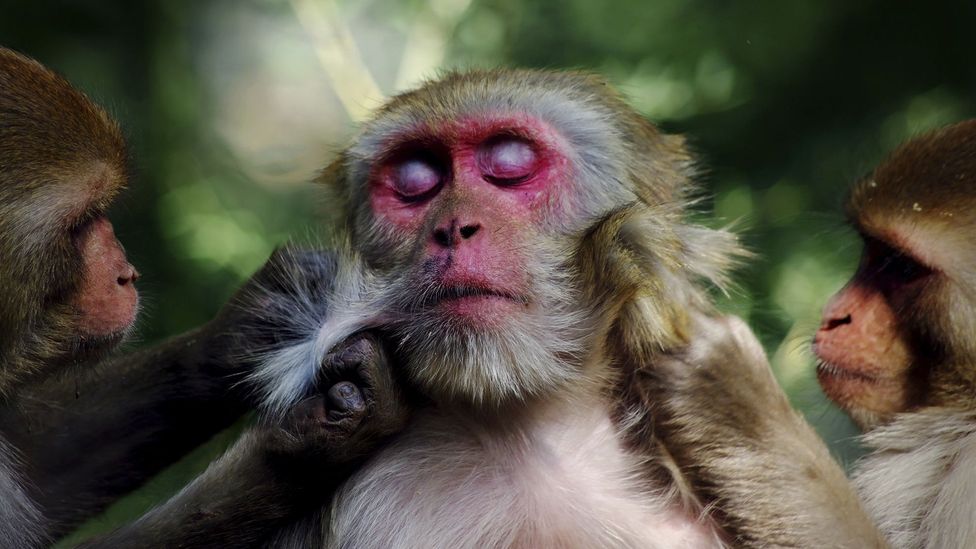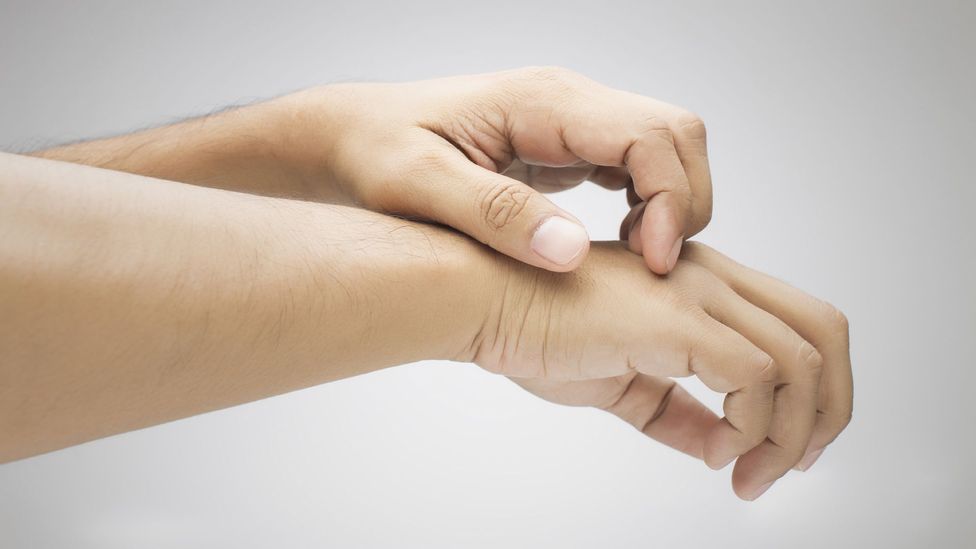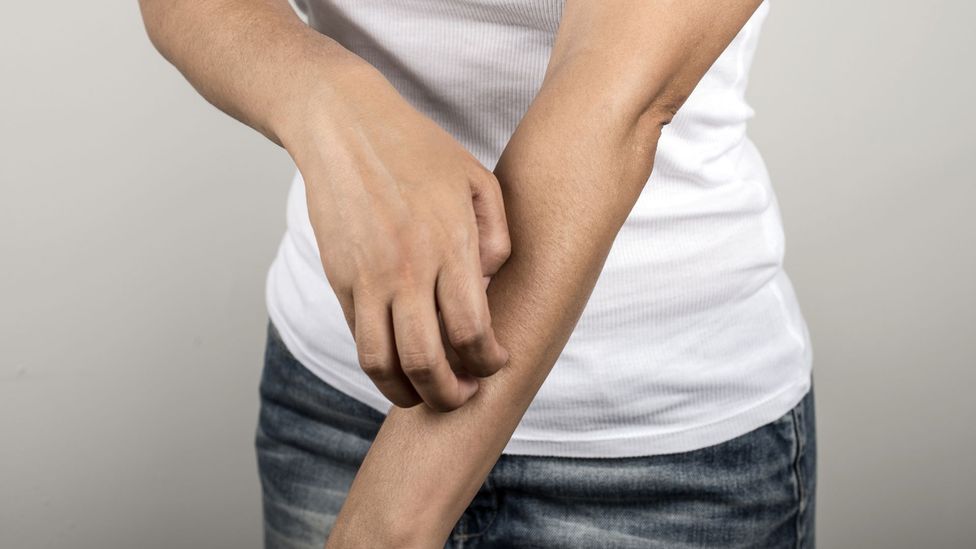Write Just to Scratch Them Out Again
Why it feels so good to scratch an itch

It's the unpleasant feeling that makes u.s. instinctively scratch and scratch and scratch. And so why does a fingernail well-nigh instantly make an itch experience ameliorate?
J
J R Traver began to itch effectually her 40th birthday, and would continue to scratch away at her pare until her decease some 40 years subsequently. The zoologist was convinced that she and two other female relatives had been hosts to a skin parasite, a mite called Dermatophagoides scheremetewskyi. After 17 years of attempting to rid her trunk of the mites, the scientist even published a paper nearly her bodily infestation in the periodical Proceedings of the Entomological Society of Washington, presumably in an effort to detect someone who might help.
To care for the problem, she visited physicians, dermatologists, neurologists, and others. She used dangerous pesticides at unhealthy levels, over and again, in an effort to impale off the bugs. Using her fingernails, she dug the mites out of her skin, mutilating her body in the process. Some of the skin samples she took from her trunk and scalp would be mailed to entomologists. One clever medico referred her for a psychological evaluation, but she managed to convince the neurologist that his services were not needed. "To appointment, no treatment applied has been able to bring about consummate eradication of the mites," she wrote.
Nosotros at present know that the Traver did non take a mysterious colony of mites living on and inside of her skin, and the skin of her family members, for 40 years. She suffered from a psychiatric disorder called delusory parasitosis, a status in which patients try to find concrete bear witness for the sensations they perceive, often to their own detriment.

Near anybody on the planet will feel an crawling at some bespeak every mean solar day - and nosotros don't always know why (Credit: iStock)
Traver's story is similar to those of others who endure from delusory parasitosis, just it still remains a adequately rare occurrence. Such complaints typically take upwardly less than ii.five% of dermatologists' time. But itching more generally is an everyday occurrence for just about everybody on the planet.
And nobody knows exactly what it is.
The definition nevertheless accustomed past about doctors and researchers today was put forth some 350 years agone by a German physician named Samuel Hafenreffer. He wrote in somewhat circular style than an crawling is any "unpleasant sensation that elicits the want or reflex to scratch". If you scratch, then the awareness that provoked information technology is by definition an itch. It's a definition that may be reliable, but information technology's probably not all that useful.
At showtime glance, itch and pain seem to be related. The peel is studded with an array of nerve endings chosen nociceptors whose task is to relay information nigh the presence of potentially damaging stimuli to the spinal string and encephalon. A weak assault on those neurons results in an crawling, while a fully fledged attack results in pain.
That'southward according to the "intensity theory". Merely there's an alternative, the "specificity theory", which holds that some neurons are responsible for pain, while a different set cares about itch, which is more formally known as "pruritus". Or it could exist that there's a single set of neurons responsible for nociception, but that they tin somehow tell the difference betwixt stimuli that are itchy and those that injure.
Obsessive scratching
That itching tin arise for then many different reasons doesn't assist. To start with, at that place's acute itch, the type nearly of u.s.a. are familiar with, which could arise from something as unproblematic as an insect bite. And then there is the more than chronic, pathological type of crawling that could be associated with dry skin, eczema, psoriasis, or other skin diseases. Brain tumours, multiple sclerosis, chronic liver disease, lymphoma, Aids, and hyperthyroidism have all been associated with chronic itch, as have diseased neurons.
Then at that place are the psychological and cognitive factors, simply not all are as creepy every bit delusory parasitosis. An obsessive need to scratch tin can exist a manifestation of obsessive-compulsive disorder; in these cases, persistent scratching tin damage the skin and only serves to exacerbate the trouble.

The pain from a scratch is very different from one nosotros might feel when we put a finger in a naked flame (Credit: iStock)
That the itch sensation can exist reduced by the application of painful stimuli only makes it an even more than curious phenomenon. Scratching is a relatively small form of pain, but the light pain we feel raking our nails beyond our skin does seem to help, as does the awarding of cold, or rut, capsaicin (the chemic that gives peppers their heat), or even a few electric zaps. This means, paradoxically, that analgesics, which are meant to reduce hurting, tin actually enhance crawling.
The defoliation between pain and crawling notwithstanding, there's a fairly straightforward difference betwixt the ii. When something hurts, our body responds with its withdrawal reflex. Put your hand almost a candle's flame and you'll experience the overwhelming desire to pull it dorsum.
But the scratching reflex brings attention towards, rather than away, from the affected skin. That actually makes good sense, and points to one possible evolutionary origin for the scratching reflex: closer inspection and a quick scratch is more effective at removing a crawling insect than would the withdrawal reflex. Scratching is a adept style to remove not merely insects and parasites, but likewise bits of plants and any other unwanted fabric hitching a ride on your peel or in your hair.
Here'south how it works: when something bothers the skin, like a mosquito seize with teeth, cells release a chemic, usually histamine. That release provokes the nociceptors in the skin to send a message to the spine, which and then relays the bulletin through a bundle of fretfulness chosen the spinothalamic tract up to the encephalon.
In 2009, researchers used a histamine injection to make the legs of their non-human being primates itch while an electrode monitored what happened inside their spinothalamic tracts. Equally shortly as the histamine was injected, those neurons began to fire, and fast. When the researchers offered upwardly a few scratches, those neurons slowed their fire. Their electrodes told them that scratching does its piece of work in the spinal string rather than in the encephalon. (Indeed, in that location is no "itch centre" in the brain.) But when scratching came earlier the injection, it didn't provide any relief. Somehow, the spine knows when scratching is helpful and when it isn't.

Scratching may have helped our ancestors rid their bodies of annoying, irritating insects (Credit: iStock)
Are you getting itchy notwithstanding? If y'all are, it's because, similar yawning, itching can exist contagious. Physicians say that they start feeling itchy later treating patients for scabies. And researchers once gave a lecture on itching only to see if they could get their audience to feel itchy, and it worked. Hidden cameras revealed that the audience spent a lot more time scratching themselves during that lecture than during a talk on a more innocuous subject. Contagious itching has even been seen in monkeys, hinting at the tantalising possibility that at that place could be an evolutionary advantage to scratching ourselves when we watch others scratching themselves.
And consider this: scratching isn't unremarkably idea of as painful and can exist downright pleasurable. In a 1948 paper in the Journal of Investigative Dermatology, Washington University Schoolhouse of Medicine neurophysiologist George Bishop noted the puzzle, writing, "scratching an itch with a violence that would crusade pain elsewhere may be experienced as one of the most exquisite pleasures". And while this makes back scratches from a loved one quite enjoyable, it can as well lead to serious problems for those with chronic itching-related diseases. Patients with eczema have reported that they scratch not until the itch has subsided, but rather until it no longer feels good to scratch.
"Happiness," said Ogden Nash, "is having a scratch for every crawling". The American poet was probably more than correct than he knew.
Bring together 500,000+ Futurity fans past liking the states on Facebook , or follow us on Twitter , Google+ , LinkedIn and Instagram .
If you liked this story, sign up for the weekly bbc.com features newsletter , called "If You But Read 6 Things This Week ". A handpicked pick of stories from BBC Future, Earth, Civilisation, Upper-case letter, Travel and Autos, delivered to your inbox every Friday.
Source: https://www.bbc.com/future/article/20160226-why-its-feels-so-good-to-scratch-an-itch
0 Response to "Write Just to Scratch Them Out Again"
Post a Comment